By Millicent Senava Mannah
The Christ Invasion Crusade, led by Dr. Seth Amoah Boateng of Victory Faith Chapel from the United States, ended on a high note, blending spiritual revival with tangible humanitarian outreach. Themed: “Jesus the Burden Lifter” (Matthew 11:28-30), the three-day event took place from September 25th to 27th, 2024, at Zion Praise Tabernacle on Hill Station in Freetown and saw thousands in attendance.
In a remarkable display of compassion, Dr. Seth Amoah Boateng and his team undertook various charitable activities, emphasizing the practical application of the gospel. Notably, a borehole was constructed for the Back of Old School community at Hill Station, providing much-needed access to clean water. In addition, they visited the Old People’s Home, distributing essential food items such as rice and onions, valued at millions of Leones.
Furthermore, over 400 less privileged individuals from various communities were beneficiaries of humanitarian aid, receiving 5kg packets of rice and 0.92 liters of oil or palm oil. The support extended beyond food donations, as the team also conducted free medical screenings for hundreds, offering treatment for various ailments and providing reading glasses to those with vision challenges. Clothing and other essential items were also distributed to those in need.
The Crusade was a unifying event, drawing together believers from different Christian denominations, alongside Muslim attendees, demonstrating the boundless nature of Christ’s love. In addition to the nightly sessions filled with worship, healing and deliverance, there were two-day empowerment sessions held in the mornings. These sessions offered training and spiritual transformation for workers, members and ministers, facilitated by Dr. Seth Amoah Boateng.
Speaking at the conclusion of the Crusade, he commended the collaboration of local ministers and organizers who made the event possible. He expressed gratitude for the overwhelming attendance and the spiritual impact witnessed, with many participants, including Muslims, committing their lives to Christ, several of whom were baptized.
Sama Banya, one of the attendees, shared her testimony of being blessed by the powerful move of the Holy Spirit during the event. Meanwhile, Tamba Yaah, a beneficiary of the free medical screening, expressed gratitude for the treatment he received for a tropical ulcer.
Attendees and beneficiaries alike were filled with gratitude, praising God for the blessings received through Dr. Seth Amoah Boateng and his team. The combination of spiritual revival and humanitarian aid left a lasting impression on the lives of many, underscoring the message that the love of Christ transcends all boundaries and limitations.
Reverend James Bangura, General Overseer of Zion Praise Tabernacle, extended heartfelt thanks to Dr. Boateng for honoring their invitation, expressing pride in having him visit Sierra Leone. Reverend Idriss Wright Samura, General Overseer of Greater Evangelism World Crusade Ministries, echoed this sentiment, appreciating the humanitarian assistance provided and hoping for the continuation of this meaningful partnership.
The week concluded with a jubilant celebration, as thousands left feeling blessed and uplifted, united in their faith and the love of Christ.











